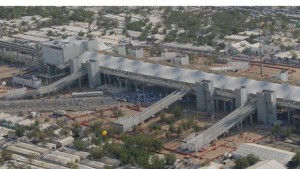By AMJAD PARKAR www.arabnews.com
ARAFAT: The Makkah Metro, formally known as the Mashair Railway, handled an estimated 66,000 pilgrims on its first full day of operations, according to railway sources.

They added that trains had been transporting Hajis from the early hours of Monday morning until 11 a.m. the same day. They were due to resume services later on in the afternoon.
There are almost 60 Malaysians involved in the running of operations as well as scores of Chinese, Pakistani and Indian technicians.
According to a Malaysian manager at one of the Arafat stations, the trains made 22 trips in total on its first full day of operations.
“Each train has 12 coaches and can bring in 3,000 pilgrims,” said the official, who did not want to be identified. “The one thing that is different here in Arafat is the number of people. I am learning lessons in crowd management here.”
The station manager is employed by Malaysian Railways and works in the country’s capital Kuala Lumpur. “The station that I manage in Kuala Lumpur doesn’t have these many passengers,” he added.
“The other important lesson I am learning is about communication. There are so many nationalities speaking so many different languages. To get our message across, and that too the right message, is the most challenging aspect. It is all a learning experience and I would want to come back here.”
He also said that station staff had been brought into the Kingdom on short-term contracts. “Once the five days of Haj are over, then we will submit our recommendations to make the service better. You can call this a trial and so far it has been pretty successful,” he said.
“The facilities at this station are still in the developmental phase. There are so many things to be carried out and streamlined and once all that is done, this will solve the problem of the movement of pilgrims from Makkah to Mina and Mina to Arafat and back.”
It is understood that although the service is supposed to be fully automated, drivers were used to operate the trains this year. The aim is to ensure that the metro is operating autonomously after two years once all improvements are implemented and it is made open to all pilgrims.
At the moment, only domestic and Gulf pilgrims are able to use the service, which is operating at a third of its capacity.
The state-of-the-art station in Arafat was quiet, with the silence punctuated occasionally by announcements in Arabic as well as English messages recorded by Arab News correspondent Roger Harrison.
Among the technicians working there was Ali Abbas Mustafa from Egypt. He has worked with Egypt Railways and was hired to provide services to pilgrims. “This is not just any other duty. It is an honor to serve the guests of God. People here are so excited to get on the train. Trains are not a rarity in Egypt but here in Saudi Arabia it is a new thing and that is why it is attracting so much attention,” he said.
The double-track 20 km Mashair Railway runs on elevated tracks beginning from the fourth level of the Jamrat Bridge above King Abdulaziz Road in Mina through Muzdalifah and ends at Station No. 3 in Arafat.
The service has nine elevated stations, three each in Mina, Muzdalifah and Arafat. The length of each station is 300 meters and each platform can hold 3,000 pilgrims.
Costing SR6.5 billion, the new railway will have the capacity to transport 72,000 pilgrims an hour.
This is the second largest project to be implemented by the Ministry of Municipal and Rural Affairs after the SR4.5 billion high-tech Jamrat Bridge project in Mina.
Habib Zain Al-Abidine, deputy minister of municipal and rural affairs, said the railway will have 10 trains in the first phase, each 300 meters long.
The railway can transport pilgrims from one holy site to the next within around five minutes.
Zain Al-Abidine said the railway would operate throughout the year. The second phase of the project will link the Mashair Railway with the Grand Mosque in Makkah, with a station on Umm Al-Qura Road.
It will also be linked to the Haramain Railway that will connect Makkah to Madinah and Jeddah.
The railway will have 20 trains in its next stage, each with 12 carriages and each carriage holding 250 passengers. About 20 percent of passengers will be seated while the rest are standing. Trains can reach speeds of up to 120 km per hour.
— With input from Siraj Wahab, Syed Faisal Ali & Galal Fakkar



















